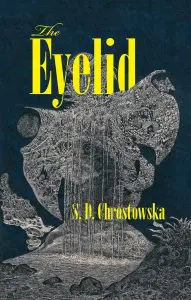
by S. D. Chrostowska
Coach House Books,
144 pages
Early in The Eyelid, a work wrapped in the silk of sleep and arms of ice, Chevauchet, the Ambassador of Onirica, explains to the unnamed narrator (hereafter N.), whose first-person account this is, one aspect of sleep:
“Those in power know that sleep is a time of freedom. Dreams awaken us to the possibility of another world, which can be enough to give us hope for it, if not always a vision of real liberty. Sometimes all we have left is hope. It is then all the more precious. And sometimes we have a wish but no hope of its coming true. Thanks to dreams, the strange glimpses they offer, we have at least a notion of freedom.”
Onirica is the realm of dreams, where anything is possible and where the real world, apart from its residue, is left behind. Conversations between Chevauchet and N., his soon-to-be successor, illustrate, with intelligence and an acute sensitivity to distinctions, how dreams, reveries, and daydreams perform separate, vital functions. We regularly read or hear, from the news and elsewhere, how lack of sleep contributes to declining health, physical stress, and mental fatigue, and we are urged to replace binge-watching Netflix or playing World of Warcraft with eight-hour sleeps. Chevauchet’s life mission, to bring more dreamers into connection with each other to form a collective unconscious (with deliberate echoes of Jung, added to Karl Marx and various European philosophers), is in the line of self-repair, at one level, but with a greater emphasis on how dreams allow for personal creativity.
However, that kind of creativity, which means imagining alternative worlds, threatens the mercantile interests of Greater America, an overweening nation-state. N. strongly resents authorities like bureaucrats, peace officers, and censors—in keeping with S D Chrostowska’s previous books Permission (2013) and the extraordinary Matches: A Light Book (2015; revised edition 2019)—who extend state control by denying citizens rest and by making mandatory their enrollment in Comprehensive Illusion (CI), a program that virtualizes the dreamworld in order to “bring forth a more docile and impotent public” who will work longer and harder without additional recompense or subversive dreaming:
The founding fathers of Greater America… recognized the threat posed by spontaneous reverie. They increasingly stigmatized such wishful thinking as inefficient, wasteful, unhealthy, indulgent, inferior, and degenerate; as child’s play, and nothing compared to the wonders of CI—the latter ostensibly providing a ‘safe’ outlet for it and, before long, a medium of its censorship.
The masterminds of CI sought by degrees to replace all natural creative imagination with artifice. They claimed it was for the sake of quality control: optimized content and better use of time, what with advances in the temporal compression of daydream experience. In reality, it was to abolish mental activity that was off the grid and went untracked.
Sleep deprivation isn’t a far-fetched concept to readers of works on torture or capitalism or, in fiction, Cherie Dimaline’s The Marrow Thieves (2017). What sets The Eyelid apart is the quivering sensibility of N. that brings to mind a mixture of Romantic and contemporary personality traits, and how the vivid dreamscapes of various unnamed characters are cleverly and seamlessly entered into in a way that can be called Surrealist. At times the language is beautiful, as in the opening paragraph:
Come autumn, the eyes reap colour against the lengthening shadows and the night that seals them closed, as if nature, having already given spring to love and summer to leisure, made a season especially for dreamers, its days hazy and heavy-lidded, its evenings haloed and smudged by rain, the hours’ hypnotic passage sleeping all who, dazed and doubled in themselves, fall leaflike under its spell.
Readers will not be surprised that nothing good can happen to a utopia like Onirica. Near the end, after N. has established a secret “Narcopolis” for those who search for sleep despite the penalties the state has established for such activity, N. sadly realizes that, for the most part, “…the world had no further need of us, or dreams, or sleep…” Chrostowska would be familiar with Nietzsche’s view, in Human, All Too Human (1878), that Hope, the one thing left in Pandora’s box, the hope Chevauchet struggles to keep alive, is another of the world’s evils, yet this bracing novel is still cautiously affirming as it closes with a brief glimpse of happiness. A libretto based on The Eyelid that captured its mix of menace, dream imagery, social commentary, and philosophy would be a rousing spectacle.
—From CNQ 107 (Spring/Summer 2020)
We post only a small fraction of our content online. To get access to the best in criticism, reviews, and fiction, subscribe!
